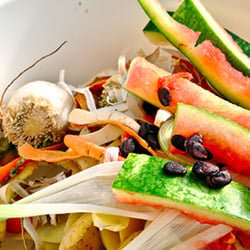 If you are composting with worms, you need to feed them the right quantity of food scraps. How much food is too much? Over-feeding your composting worms can cause problems in the bin, including odors, acidity, excess moisture, pests and sick worms. What should you do to prevent and address these issues? Here are Uncle Jim’s guidelines for feeding the right amount of scraps to composting worms.
If you are composting with worms, you need to feed them the right quantity of food scraps. How much food is too much? Over-feeding your composting worms can cause problems in the bin, including odors, acidity, excess moisture, pests and sick worms. What should you do to prevent and address these issues? Here are Uncle Jim’s guidelines for feeding the right amount of scraps to composting worms.
Quick Check: How Much Food is In There?
Dig around in the bin. How much undigested organic material is in there? The worms should start working on a feeding within a few days and finish it within 1 to 2 weeks. If you see large amounts of food, you are probably overfeeding. Under ideal conditions, worms can eat their weight in scraps per day. So if you have 1 pound of worms, you can theoretically feed them 1 pounds of scraps. However, we recommend you play it safe by feeding an amount they can handle every 2 or 3 days.
Over-Feeding Causes Odors
The most noticeable sign of overfeeding is a foul odor. Worm bins should have an earthy smell. If your nose is offended, your worm bin needs improvement. The worms’ job is to eat the food before it gets super-rotten and stinky. If you add too much food at a time, they cannot keep up. Too much food can also push the air out of the bin, leading to foul-smelling anaerobic decomposition.
If you are composting outdoors, this issue is less important than if you compost indoors. No matter the bin’s location, though, odors are a sign of trouble. Make sure that all food is buried at least 1 inch deep. Cut the food up small or use a food processor so the worms can work through it faster. Remove large chunks of food and any malodorous items. Whittle the scraps down to a couple of manageable pockets of food. Add oxygen by gently fluffing up the bin — use a hand fork, and be careful not to hurt the worms. Follow our Feeding Pattern below. If this does not work, see our detailed Worm Bin Smell Trouble-Shooting Guide.
Too Acidic
Sometimes a good worm bin goes bad because the worm’s habitat is too acidic. Acidic bins will have a terrible smell. Worms might seem sick and start to die. This situation can be triggered by too much food. The type of food you use makes a difference. You should not add large amounts of tomatoes, pineapples, orange peels, lemon rinds, etc. Acidic foods lower the pH of your worm bin. So do excessive amounts of grains such as wheat and cornmeal.
If you can measure the worm bin’s pH, aim for a number between 6.0 and 7.0. To reduce acidity, start by removing the lid. This allows airflow. Mix some shredded newspaper and/or pure dry peat moss into the bedding. Crush clean eggshells and add them to the bedding. Gently turn the bedding. And pray. Your composting program might be in peril.
Pests
Some amount of insect activity is normal in a worm bin. Composting is a natural process, and a few bugs will hang around the worm bin. Most of them harmlessly help break down the food. However, too much food can attract a noticeable and irritating population of pests. Outdoors, furry neighborhood pests might start munching — which isn’t an inherent problem, but it might bother you or your worms. Minimize this by burying the food and not feeding too much. If you have fruit flies indoors, see our Fruit Fly article.
Excess Moisture
Many kitchen scraps are watery, such as melon, zucchini, etc. If you add too much food, excess moisture can collect in the bin. The bedding should feel like a wrung-out sponge. If you can squeeze water out of a fistful of bedding, or if you see puddles, the bin is too wet. There are several possible reasons, but one reason is over-feeding.
Blot any puddles with paper towels or clean, dry rags. Remove watery foods. Check the drainage holes to make sure they are open. Mix in some pure dry peat moss or shredded newspaper to soak up some of the moisture. You can try running a fan over the bedding surface, but this may have a limited effect. Make sure rain cannot get in. See our article on Worm Blankets and Lids.
Recommended Feeding Pattern for Composting Bins
Start by feeding in one corner of the bin. Bury the food and cover it with at least 1″ of bedding. Wait a few days, then put the next feeding right beside it. Continue to work your way around the inner walls of the bin. By the time you get back to the starting point, the original feeding will be gone. This technique makes the food very easy for the worms to find, speeding the process. It also tells you how old each pocket of food is, so you can easily monitor the worms’ progress.
A healthy diet in the right quantity will keep your worms healthy and productive. Take care of your worms, and they will produce excellent organic fertilizer from kitchen scraps.
Uncle Jim’s Worm Farm is the #1 supplier of composting worms in the USA. Please check out our website for live worms, indoor composters and composting supplies, plus finished compost.
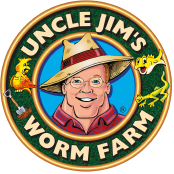

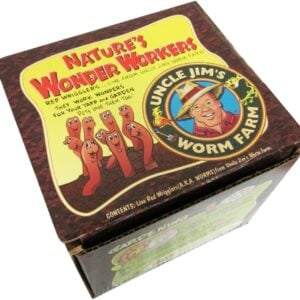
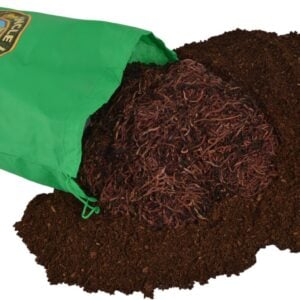
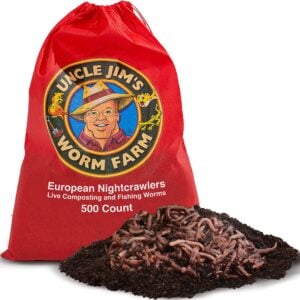
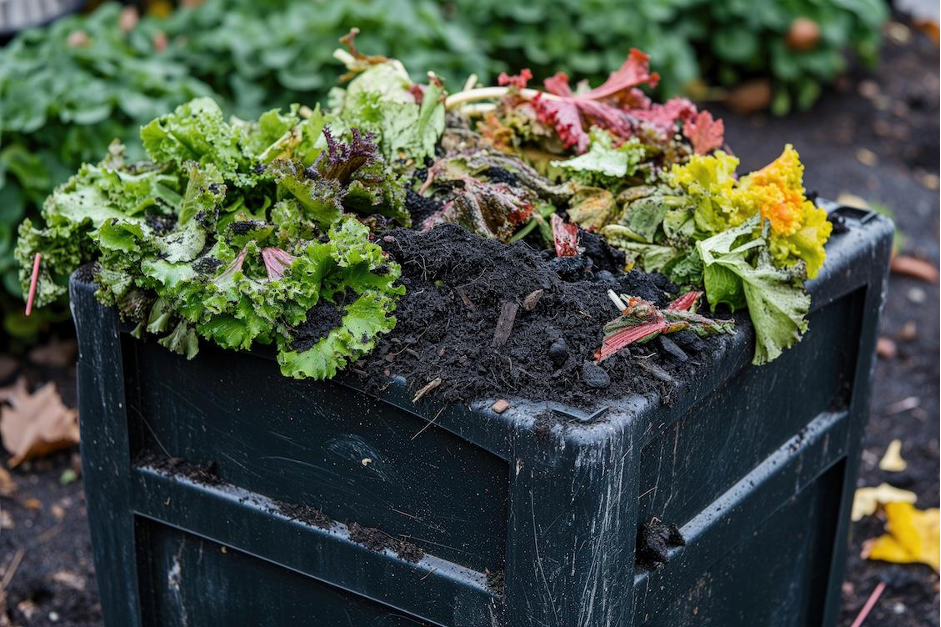
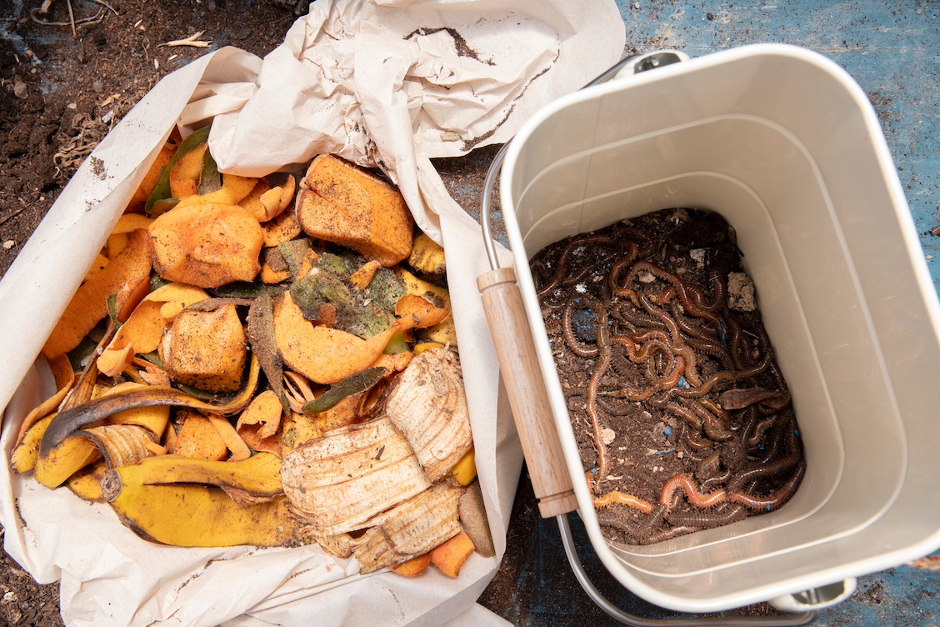

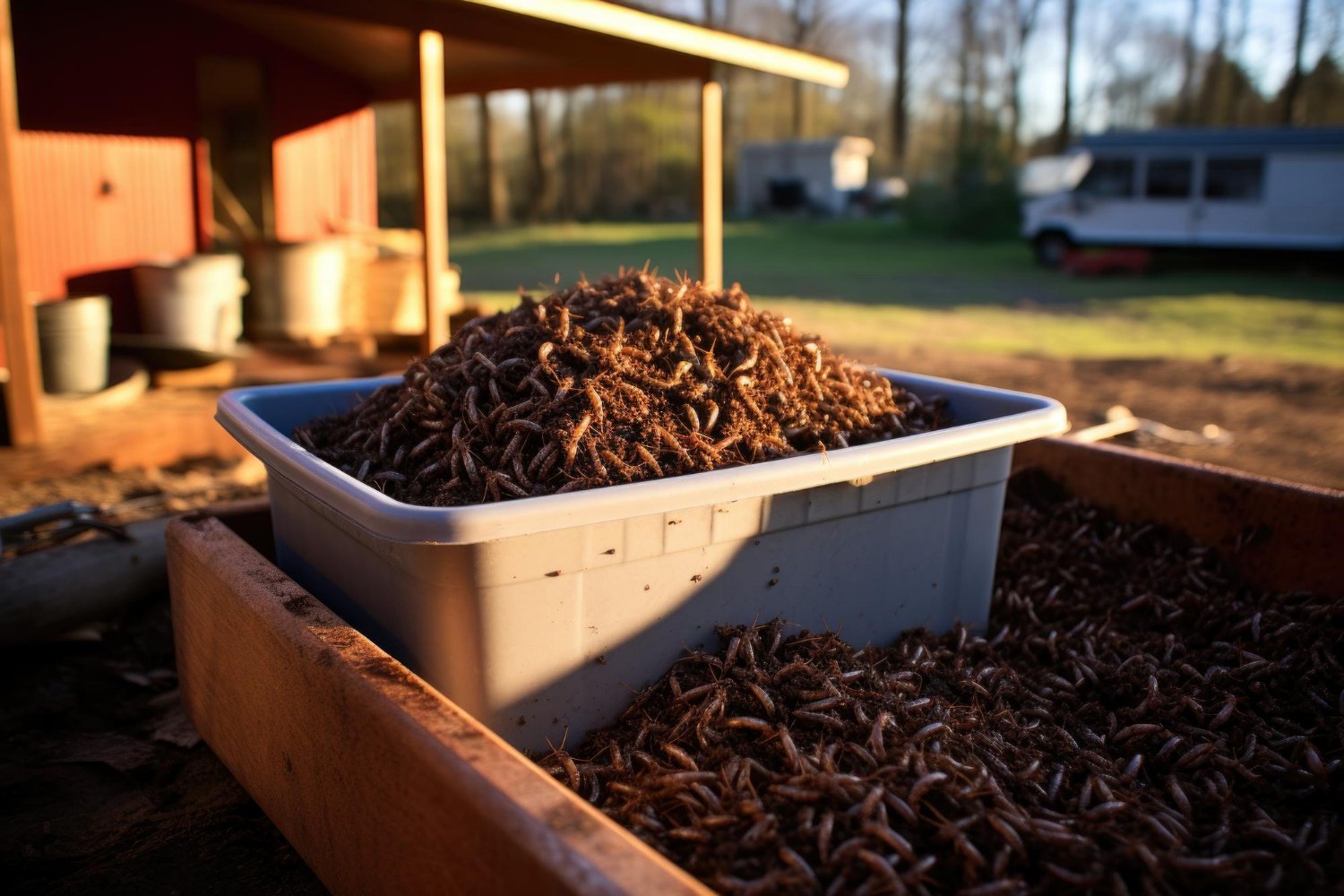
31 thoughts on “How to Avoid Over-Feeding Composting Worms”
My worms were doing fine until the Summer heat hit North Carolina(Charlotte area ). I keep my bins(3) in the garage and they began to dwindle in the heat. We had a ton of 95 degree days here. They are starting to come back now that the weather is cooler. I now have gone to in ground composting . I cut the bottom out of a 5 gallon bucket, drill multiple holes in the side, bury it up to the rim, add veg scraps and put the lid on it with a stone on top . When its full I pull the bucket up and dig another hole for the bucket and repeat the process.
What a great idea Harvey Miles. Since I live in New York I will definitely try this method in the spring.
Thank you for sharing your technic.
I can not believe what we found in our worm bed!
Ready?
A huge rat shredded our newspaper and had her little rats in bed!
I was amazed!
Well, needless to say we got rid of it. And I guarantee no other rats can come in !
I have found that by grinding up the matter before feeding, it is easily distributed among the existing bedding. I always add some fresh shredded bedding as well. Worms constantly surprise me – for instance, I had put some paper towels at the bottom of the lower tray, and one day I came back and there was no paper towel left at all. I thought I was imagining things.
When I first received the worms, I had started by over feeding them – I knew this very soon and I started seeing flies that had come in from outdoors. At first, there was only one big fat fly, but in a week, there were a few dozen flying around my apartment. I found a perfect solution to this, and that is buy getting a Bug-A-Salt gun. So – today, I can’t even find a fly as hard as I look – alas, my target practice is now gone. Disclosure: I am not a representative for this product, this is a personal testimonial for something fun and practical.
You say you grind your food. Are you talking about running it through something like a blender and just putting torn paper scraps over the top?
I don’t see cupped baits in you’re email ad, did you discontinue them?
Hi Roger,
Yes, we did.
You have got to be kidding!!! If anyone questioned whether they should start a vermicompost bin, the above narrative probably made that decision for them…no way would anyone go to the trouble of what you are suggesting above. Composting is supposed to be easy. You just made it really difficult
I left my worms in the house when I went on vacation in July I left the temp on at 76.
I ground up food and froze it into 5 bags using my scraps for a week. My neighbor fed and checked on them every week. She used a spray bottle if the soil was homecoming too dry and she removed the food from the freezer the night before.
When I got home they were all dead. This is the third time I have tried to use worms. I also got the chicken scratch and buckwheat put it into blender and sprinkled on top bin.
What is wrong with the care of the worms?
From my experience if you let a neighbor or friend take care of your pets, they’re as good as dead.
Nice! This past year I was able to harvest 16 gallons of super finely sifted castings from my outdoor bin. I’m still working from the original red worm order from Uncle Jim’s back in 2013 and these guys are going strong! I leave them outdoors all Winter in zone 6 Western PA, but they’ve continued to thrive. My box is bottomless which eliminates issues of excess moisture. In general, I’ve found that using multiples layers of ripped up cardboard makes for a great buffer between the greens.
Hi Al,
I imagine winter in your area must be cold. What do you do to help the worms survive outdoors during winter?
Thanks.
How do I keep my worms in the bin. Is it normal for them to crawl the sides of the bin when there is food available? Yes, conditions are good! I have worked the moisture, and the smell but the won’t stay off the walls. How to fix that?
Christine Hayes: you don’t need to freeze your scraps. Just bury them in with the warms. I only use fruit and veggies, coffee grounds and a little egg shells every now and then. They love it when I don’t use my lettuce fast enough. Cover the top of soil with a damp newspaper and you never need to worry about fruit flies or smell. I’ve been doing this for 5 years with the same worms and it’s going great.
Add a small LED light inside. They will stay below the top dressing because they avoid light.
We can have some real hot summer days in Australia….I wrap an ice brick and put in the worm farm ..they love the coolness..when it is time to remove it is covered in worms.
I have a question. So I started throwing food scraps and cardboard into a compost bin that spins and I have about half of it full. Would it be safe to dampen the compost, add moist newspaper, and throw in the worms?
I bought a ph and moisture meter. Where in the moist range should my worm bed be? In the middle of the moist range or closer to wet or dry?
I bought a ph and moisture meter. Where in the moist range should my worm bed be? In the middle of the moist range or closer to wet or dry?
Can you compost junk mail and old documents? I remember reading not to use the stuff that’s printed on glossy paper. Not sure why since I believe most of it is now printed with vegetable inks..
Eventually I’ll be starting a little worm habitat in a large glass jar, I’m unsure still how to feed them when they are in a large glass jar, my my only conclusion is a Rube Goldburg Machine since I’m lazy and my habitat will be in my apartment but not in the direct sunlight parts of the place since that would kill them, I’ll also be feeding them coffee grounds since worms just LOVE coffee grounds, besides, they’re good for them.
Moisture should be 60-75% on water meter.
I just received my 250 worms and in excitement misread to add food scraps after 1-3 days of putting in bedding. Food scraps: 1/2 tomato, romaine letter, carrots, blueberries mixed into moist bedding of egg cartons and newspaper in Urbalive 2 bin container. Did I just kill my worms? Or what should I do to save?
Hello Eleanor;
That will not kill them off. it is okay to feed them early on, they might not eat right away as they need to settle into the new environment but they should be fine.
Uncle Jim’s Worm Farm
What is the best substrate for the worms. I have seen many different answers. Even Jim says in an article that the best bedding is shredded brown cardboard. I just want to get as close as I can to replicating what they ate used to. I can make the ecosystem , just need to know what it is. Thanks jims
The best substrate or bedding for the worms is a mix of a few of these items, but it is important to have browns and greens in the bin for healthy worms. Peat Moss, Coconut Coir, top soil. shredded paper and/or cardboard, leaves, coffee grounds, grass clippings, etc.
Uncle Jim’s Worm Farm
I’ve had my worms less than a week and one of the hardest things for me is to have a sense of whether I’m doing it right and, if I see something unusual, what if any action should I take.
One thing that would help, Uncle Jim, would be having your wonderful advice all in one place, like bullet points that are easy to read, under headings that made them easy to find.
Mine are still alive, active, and they smell okay so I guess it’s going okay so far. Thanks for getting me started.
Hello Mary;
That would be great if we could make it that simple but there is a ton of information and lots of different questions that people have. Basically, if your worms are healthy, eating, the bed does not stink and you eventually see babies? You are doing everything right. Temperature, Moisture, food and oxygen are the most important things in a worm bin. if they are balanced, the worms usually thrive.
Check our site under Education/blog. There is a lot of great information there!
Uncle Jim’s Worm Farm
I’ve had my bin going all summer and they seem to be doing fine. I’m thinking of putting them into a small green house for the winter. I made a bin out of a 50-gal plastic drum. My question is How do I separate the worms from the compost when it comes time to harvest the compost?
Hello,
We got worm bins from Vero Garden beds that we buried to the lid in the raised beds and put 200 worms in each bin with cut up cardboard, soil and food (kitchen scraps). I can’t tell if we are over feeding or if the worms are doing okay. I put the food right on top of the soil, didn’t bury it, which I’m going to do today. But the food does look like it’s being eaten and we have a lot of fruit flies in the bins now.
Did I over feed? Did I harm the worms? How can I tell and what mistake did I make that I can correct for the future.
Thank you so much for you site …. this is the first time we have tried putting worms in our vegetable garden.
Valerie
Hello Valerie;
If you keep in mind that 1000 Red Composting worms can eat up to 1/2 pound of food a day, 200 worms will not eat a lot daily. If you have a lot of compost, it is important to have enough worms to handle the food that you add to the bin or the exposed food will draw all sorts of insects. Try to Cover or bury it if you need to or remove some of it and add only what the worms can eat in a few days time.
Uncle Jim’s Worm Farm